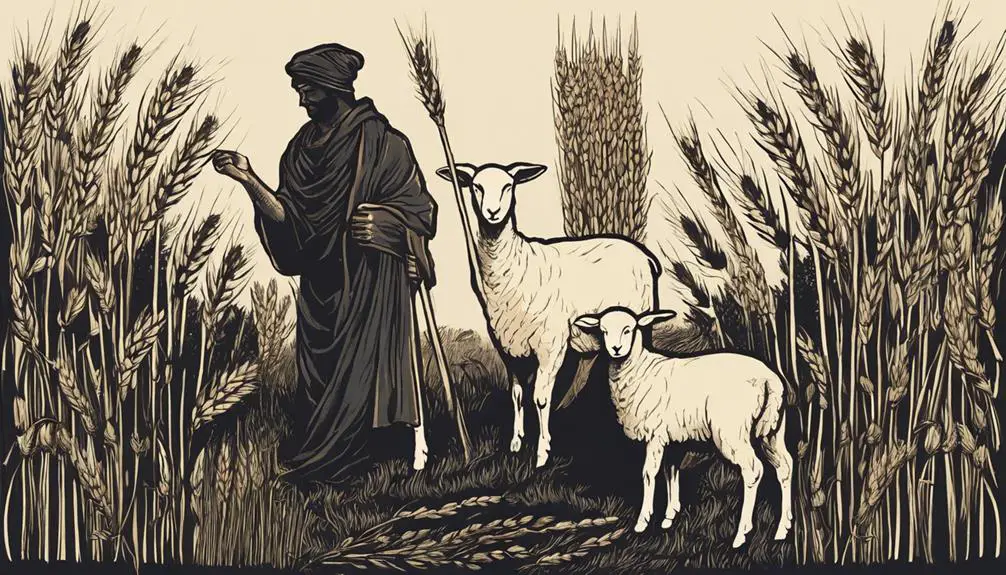Explore the multifaceted nature of jealousy in biblical stories, from Cain and Abel to Saul and David, and uncover its profound implications.

Types of Jealousy in the Bible
Isn't it curious how often you come across the theme of jealousy in your daily life, only to find it mirrored in the tales of the Bible? From Cain's envy of Abel, sparking the first act of violence over favor, to Saul's dangerous obsession with David, the scripture intricately explores various shades of jealousy.
You've got Solomon cautioning against the corrosive nature of envy and even God expressing a form of righteous jealousy. Each narrative offers a unique lens on this complex emotion, inviting you to consider its impact and implications.
This conversation could illuminate not just historical or spiritual insights but also personal reflections on how jealousy shapes our world.
Key Takeaways
- Jealousy ranges from personal envy, like Cain's towards Abel, to destructive obsessions in power dynamics, exemplified by Saul and David.
- The Bible warns against jealousy, emphasizing its potential to corrupt the spirit and undermine relationships, as seen in Proverbs and Solomon's teachings.
- Divine jealousy is portrayed as stemming from love and a desire to protect the covenant, highlighting a distinct, positive aspect of jealousy.
- Overcoming jealousy involves cultivating contentment, wisdom, and rejoicing in others' successes, aligning with biblical virtues to counteract envy's negative effects.
Cain and Abel: Envy's Birth

In the narrative of Cain and Abel, we observe the genesis of envy, marking a pivotal moment in biblical history where sibling rivalry escalates to fratricide. This story illustrates how envy can corrode relationships, especially when coupled with the desire for divine favor. Cain's murder of Abel, driven by jealousy over God's acceptance of Abel's offering and not his, underscores the destructive capacity of envy. This act isn't merely about sibling rivalry; it's a profound exploration of human nature and the complexities of fraternal relationships.
The acceptance of Abel's offering over Cain's is pivotal, highlighting the role of divine preference in triggering envy. This preference doesn't just catalyze sibling rivalry; it sets a precedent for understanding acceptance and rejection's deep emotional impacts. The narrative delves into the psyche of envy, illustrating how a perceived slight in offering acceptance can escalate to extreme actions. It's a cautionary tale about the consequences of letting envy go unchecked, teaching us that unchecked jealousy can lead to irreversible actions. Through Cain and Abel's story, we're shown the extreme lengths to which envy can push individuals, reshaping not just their lives but the fabric of their familial bonds.
Saul's Obsession With David
Shifting our focus to another biblical narrative, we observe Saul's growing obsession with David, a story that further explores the destructive nature of jealousy within the contexts of power and divine favor. As we delve into the intricacies of this tale, it's crucial to understand how Saul's decline intertwines with David's rise, highlighting the corrosive effect of envy in leadership and mentorship dynamics.
Here are three pivotal moments that define this narrative:
- David's Victorious Return: Following David's triumph over Goliath, the women's songs of praise for David over Saul sowed the seeds of jealousy in Saul's heart, marking the beginning of Saul's decline.
- Saul's Murderous Intent: Saul's jealousy escalates to the point of plotting David's death, showcasing how envy can drive a person to consider extreme actions against whom they perceive as rivals.
- Divine Favor Shifts: As Saul's envy consumes him, it becomes evident that divine favor shifts towards David. This transition symbolizes not just a change in leadership but also serves as a cautionary tale about the consequences of letting jealousy overtake one's virtues.
Through Saul's story, we're reminded of the potent, destructive capacity of jealousy, especially when coupled with power and the desire for divine approval.
Solomon's Warnings Against Envy

King Solomon, renowned for his wisdom, starkly warns against the perils of envy in his writings, emphasizing its capacity to corrode the human soul. He delves deep into the heart's discontent, highlighting how envy's consequences can devastate not only personal well-being but also communal harmony. Solomon's admonitions aren't just moral guidance; they're an astute observation of human nature and the destructive path envy carves through the fabric of society.
Through his proverbs, Solomon doesn't merely condemn envy; he offers a profound understanding of its roots and effects. He suggests that envy stems from a heart's discontent, a deep-seated dissatisfaction that blinds individuals to their blessings, focusing instead on what others possess. This perspective isn't merely cautionary but deeply analytical, dissecting the layers of envy to reveal its core.
Moreover, Solomon's warnings against envy are framed within a broader discourse on wisdom and folly. He contrasts the peaceful, fulfilling life of the wise, who focus on gratitude and contentment, with the tumultuous, dissatisfied existence of the envious. By doing so, Solomon doesn't just highlight envy's consequences; he underscores the importance of nurturing a contented heart and the wisdom in appreciating one's own lot in life.
God's Righteous Jealousy
Exploring the concept of God's righteous jealousy reveals a facet of divine character that challenges our understanding of jealousy as purely negative. This form of jealousy, far from being petty or vindictive, is deeply rooted in divine love and a commitment to the well-being of humanity. It's an expression of God's protective jealousy, ensuring that His relationship with His people remains uncorrupted by idols or false beliefs.
Here are three key aspects to consider:
- Divine Love: God's jealousy isn't about possessiveness but about a deep, abiding love for His creation. It's a desire for a pure, undivided relationship with humanity, free from the distractions and detriments of idolatry.
- Protective Jealousy: This form of jealousy serves as a protective measure. It's God's way of safeguarding His people from paths that lead away from His blessings and towards spiritual harm.
- Covenant Relationship: God's righteous jealousy is also about maintaining the covenant. It's a reminder of the exclusivity of the relationship between God and His people, mirroring the faithfulness expected in human relationships.
Understanding God's righteous jealousy helps us appreciate the depth of His divine love and the lengths to which He goes to protect His covenant with humanity.
Jealousy in Proverbs and Wisdom

The Book of Proverbs presents jealousy as a complex emotion that, when uncontrolled, can erode the foundations of wisdom and human relationships. This text, deeply rooted in the wisdom tradition, contrasts wisdom's virtue with envy's folly, offering a nuanced understanding of how these forces interact within the human psyche. You'll find that Proverbs doesn't merely condemn jealousy; rather, it acknowledges its potential to distract and detract from the pursuit of wisdom and a fulfilling life.
Wisdom's virtue, as portrayed in Proverbs, involves the cultivation of a content and discerning heart, one that rejoices in the success and well-being of others. This virtue acts as an antidote to the poison of envy, which Proverbs warns can corrupt the spirit and lead one down a path of bitterness and isolation. The text suggests that envy's folly lies in its ability to blind individuals to their own blessings and potential, trapping them in a cycle of resentment and missed opportunities for personal growth and community building.
In essence, Proverbs offers a compelling argument for embracing wisdom's virtue as a means of overcoming the destructive nature of jealousy. Through this lens, you're encouraged to reflect on the value of nurturing an appreciative and generous heart, both as a personal practice and a communal ethic.
Frequently Asked Questions
How Does the Concept of Jealousy Differ When It Is Portrayed by God Versus When It Is Portrayed by Humans in the Bible?
When you explore jealousy in the Bible, you'll notice a stark contrast. God's jealousy stems from divine nature, reflecting a protective love and a desire for fidelity. It's about maintaining a sacred relationship.
On the other hand, human jealousy is often rooted in human flaws like insecurity and envy. This distinction highlights how divine jealousy is seen as righteous, while human jealousy usually points to personal shortcomings and moral challenges.
Are There Examples of Jealousy Leading to Positive Outcomes or Lessons in the Bible, Outside of the Commonly Discussed Stories?
Absolutely, jealousy isn't always the green-eyed monster it's made out to be. For instance, sibling rivalry in the story of Joseph and his brothers eventually led to Joseph's rise in Egypt and the survival of his family during famine.
Similarly, the prodigal son's brother's envy highlights the grace of forgiveness and redemption. These narratives teach us that even in jealousy, there's room for growth and learning about divine grace and human forgiveness.
How Do New Testament Teachings Address and Reinterpret the Concept of Jealousy Presented in the Old Testament?
In the New Testament, jealousy is reinterpreted through the lens of divine compassion and apostolic guidance. This shift emphasizes a more introspective and spiritual approach, focusing on the transformation of the heart and mind.
Instead of the punitive and often external reactions seen in the Old Testament, the New Testament encourages you to reflect internally, fostering a community built on love, understanding, and the rejection of envy.
In What Ways Is Jealousy Used as a Metaphor in the Bible for Larger Spiritual or Moral Lessons, Beyond the Literal Narratives of Cain and Abel, Saul and David, Etc.?
You'll find that jealousy in the Bible isn't just about personal grudges; it's a complex symbol for deeper spiritual lessons. This symbolism extends beyond stories like Cain and Abel or Saul and David.
Jealousy often represents the tension between divine fidelity and human infidelity, highlighting the consequences of straying from spiritual commitments.
Can the Feeling of Jealousy Be Completely Eradicated According to Biblical Teachings, or Is It Considered a Natural Part of the Human Condition That Must Be Managed?
You might wonder if you can ever fully escape jealousy or if it's a part of being human you just have to deal with.
According to biblical teachings, while striving for jealousy eradication is ideal, complete elimination mightn't be realistic. It suggests that jealousy, in some form, is woven into the human condition.
Therefore, it's more about managing and mitigating this emotion rather than eradicating it entirely from your life.
Conclusion
In conclusion, the Bible presents jealousy in multifaceted dimensions, from Cain's lethal envy to God's protective zeal. Remember, 'Envy is the ulcer of the soul.'
Saul's obsession and Solomon's cautions teach us the destructive potential of unchecked jealousy. Through Proverbs, wisdom is imparted on navigating this complex emotion.
Analyzing these narratives, one discerns jealousy's dual nature: as a corrosive human frailty and a divine attribute, underscoring the necessity of discernment in its appraisal.



Sign up